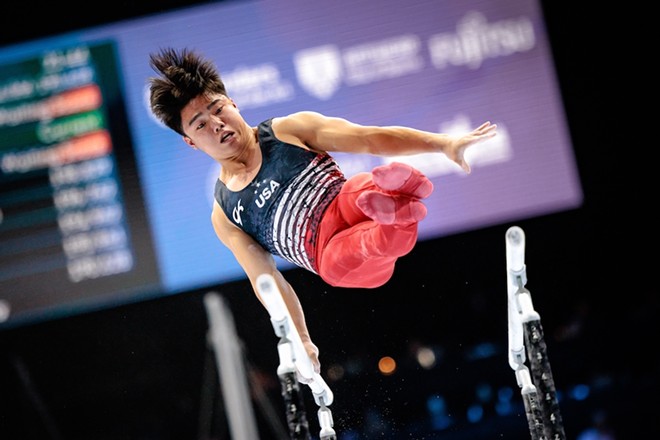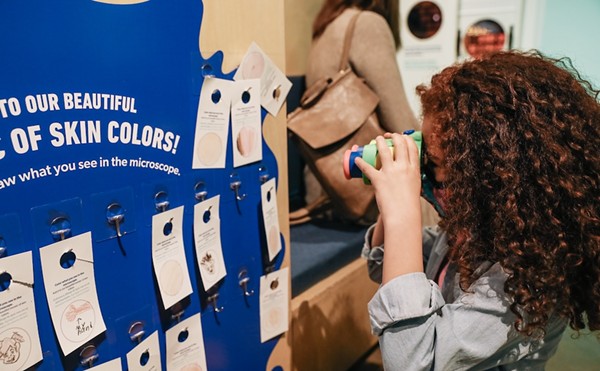
No stranger to symbolic nativist displays, Texas Gov. Greg Abbott recently gushed with praise for Olympic athletes who hail from Texas. Midway through the summer games, he’d already posted to social media a half dozen times exulting the inspiring accomplishments of athletes including Plano native and gymnast Asher Hong and University of Texas at Austin senior Luke Hobson, who took home bronze in 200-meter freestyle swimming. As Simone Biles, a native Texan, shared the gold with her teammates, Abbott trumpeted her as the “most decorated US Olympic gymnast in history.”
“Texas is well-represented at the Olympics this summer. We have the 3rd-most athletes competing among the states,” Abbott tweeted a day before events kicked off in Paris. “Texas is proud of you all. Good luck!”
Well said, Gov. In all, 41 Olympians from Texas are representing the United States in the 2024 games. And aside from sharing an inane piece of culture-war clickbait about an alleged mockery of Leonardo da Vinci’s The Last Supper during a drag queen-bedazzled opening ceremony — c’mon, it’s Paris, France, not Paris, Texas — Abbott’s focus on rooting for the home team provided a brief respite from his usual hyper-partisan nastiness. It provided a much-welcomed breeze of cool civil air.
A bipartisan consensus ought to emerge, however, that when it comes to our country’s non-symbolic support for Olympic athletes, we’re not putting our money where our purported patriotism is.
In an excellent article, Houston Chronicle sports reporter Danielle Lerner informed unaware readers like myself that “unlike most countries, the United States does not provide government funding for its Olympic and Paralympic committee.”
Even though the “American sports ecosystem frames the most visible professional athletes as wealthy titans,” she wrote, “the majority of Olympic sport athletes, particularly those in niche individual disciplines like wrestling, cycling and fencing, often have to borrow money or work odd jobs to make ends meet while chasing their dreams.”
Her interviews revealed that one cyclist lived in a van, while a boxer picked up cash working as a birthday clown and a taekwondo fighter delivered food to make ends meet.
To be sure, 54% of these high-performance athletes make less than $50,000 a year, and more than a quarter of them earn less than $15,000, according to a 2024 report from the Congressional Commission on the State of U.S. Olympics & Paralympics.
Since nearly half of the athletes earn no net compensation, the Commission found “many of America’s most talented athletes must pay for the privilege of competing under our flag.”
“You feel what you’re doing is not worthy in the eyes of whoever, anybody, to get paid for what you’re doing,” Houston-based fencer Courtney Hurley, who won bronze in 2012, confided to Lerner.
You can’t eat applause, after all.
“Some of the most talented competitors go to sleep at night under the roof of a car or without sufficient food or adequate health insurance,” the Commission reported. “Leaders tasked with overseeing movement sports have instituted policies that prioritize revenues over the development of their sports and the well-being of those they are meant to serve. The current system promotes near-term incentives for medals over equitable access to sports by millions of Americans. In nearly every case, the losers have been the athletes.”
Hopefully, the XXXIII Olympiad will light a torch under the asses of those very leaders. Even those who are flyweights in common decency should grasp that “[y]ou get better performances out of us when we have less to worry about,” taekwondo fighter and silver medalist CJ Nickolas told Lerner.
Of course, none of this is to present the Olympics in rose-colored hues. The funny people at left-leaning YouTube podcast Some More News recently laid out the ongoing history of the games as a corrupt, environmentally unfriendly, human rights-abusing juggernaut.
“They’re bad for the place they’re held, bad for governments, bad for human rights and bad for the entire world,” host Cody Johnston lamented. “But despite everything I’ve said, I’m actually not suggesting that we do away with the Olympics.”
Except, he added, “We don’t need to embark on billions of dollars in new construction projects just so 1,000 people can watch a beach volleyball game. Even if the Olympics remains at its current gargantuan, carbon-belching scale and continues terrorizing our greatest world cities like a fit, inspirational kaiju, the International Olympic Committee could still make a huge difference simply through more accountability and better enforcement. Either the Olympics reforms itself and actually gets better, or it just becomes such a trash factory that we stop having them.”
That would be an incalculable loss for all involved. Channeling our rivalry, chauvinism, and aggression into noble exhibitions of human excellence heralds a day when every battlefield will be replaced by a playing field.
But if you don’t want to take care of the soldiers, don’t start the war — even if by other means.
No worker should be “constantly worrying about making a living wage,” as Lerner aptly put it — especially not those whose Herculean efforts and fanatical dedication offer an uplifting example for us all.
Subscribe to SA Current newsletters.Follow us: Apple News | Google News | NewsBreak | Reddit | Instagram | Facebook | Twitter| Or sign up for our RSS Feed

















